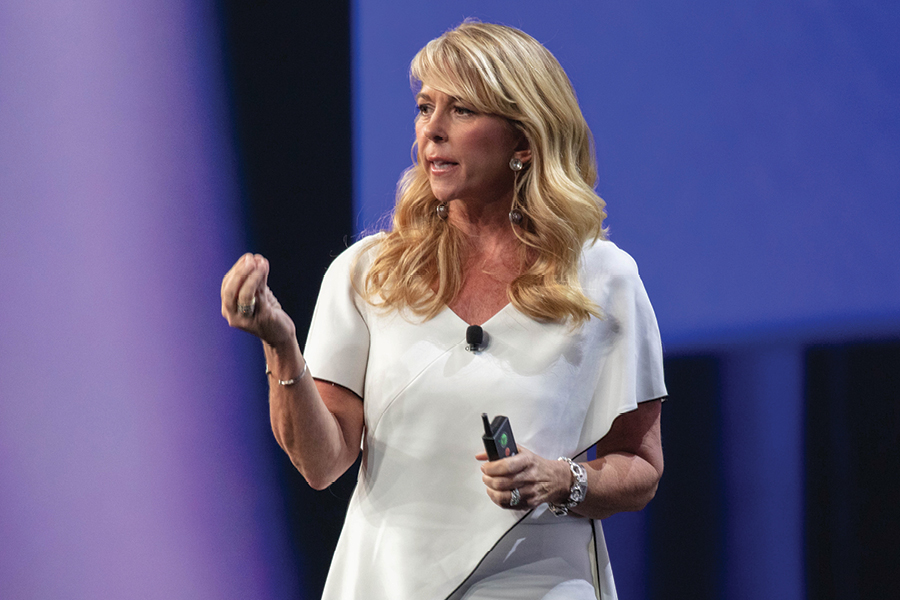

The next economic cycle will likely require more strategic investing, and the ride could get bumpy, said Liz Ann Sonders, chief investment strategist at Charles Schwab & Co.
Speaking Tuesday in Chicago at the Morningstar Investment Conference, Sonders said the economy is in the early days of what she dubbed “the temperamental era,” which will be characterized by economic and geopolitical volatility, and more frequent recessions with sharper growth in between.
“I’m quite optimistic about the investment side of the economy,” she said. “This is a bit of a normal cycle; what preceded it wasn’t terribly normal.”
Sonders’ remarks were part of a live podcast presentation for Morningstar’s "The Long View" podcast, co-hosted by Christine Benz, director of personal finance and retirement planning, and Jeffrey Ptak, chief ratings officer.
While Sonders described the past three years of pandemic, government stimulus and runaway inflation as abnormal, that period wrapped up the 30-year economic cycle described as “the great moderation.”
With some sectors of the economy already experiencing recession as part of a “rolling recession,” Sonders said she expects an official recession to be declared at some point. But because recessions are typically declared well after the economy has already begun to experience them, Sonders said it’s more important to look forward to some of the “excesses that still need to be wrung out.”
Along those lines, she cited a unique development in the labor market, where higher-level jobs are being cut ahead of lower-level jobs, which is why she believes the unemployment claims haven’t been as high despite the economic challenges.
Specifically, on the subject of excesses in the economy, Sonders mentioned all the focus on the recently collapsed Silicon Valley Bank, often referred to as SVB, and said “the focus has been on the B and not the SV.”
Her point is less about the geography of Northern California than it is about what the bank’s high-risk exposures represent, Sonders said.
“I’m talking about what was given support in an environment of ample liquidity,” she said. “When the tide went out, SVB was clearly a naked swimmer.”
Because Sonders isn’t convinced the Fed has yet gotten control of inflation, she anticipates a period of “reconnecting fundamentals to prices.
“Equal weight is doing well relative to cap weighted, and active is doing at least as well as passive,” she said. “And this also supports a factor orientation versus monolithic investing.”
Sonders also took the audience slightly into the weeds with a tutorial on how to avoid being lured into oversimplified allocations to growth and value stocks.
She explained that across the various growth and value indexes offered by S&P and Russell, what are promoted as similar indexes can have widely divergent sector weightings.
“There are three ways to think about growth and value,” Sonders said. “There’s the preconceived notions, then there’s the indexes, then there’s the actual characteristics of growth and value. I think investing based on the characteristics of growth and value makes all the sense in the world, but don’t put blinders on. Think of the factors of growth and value, because it’s the characteristics that matter.”

A Texas-based bank selects Raymond James for a $605 million program, while an OSJ with Osaic lures a storied institution in Ohio from LPL.

The Treasury Secretary's suggestion that Trump Savings Accounts could be used as a "backdoor" drew sharp criticisms from AARP and Democratic lawmakers.

Changes in legislation or additional laws historically have created opportunities for the alternative investment marketplace to expand.

Wealth managers highlight strategies for clients trying to retire before 65 without running out of money.

Shares of the online brokerage jumped as it reported a surge in trading, counting crypto transactions, though analysts remained largely unmoved.
Orion's Tom Wilson on delivering coordinated, high-touch service in a world where returns alone no longer set you apart.
Barely a decade old, registered index-linked annuities have quickly surged in popularity, thanks to their unique blend of protection and growth potential—an appealing option for investors looking to chart a steadier course through today's choppy market waters, says Myles Lambert, Brighthouse Financial.
